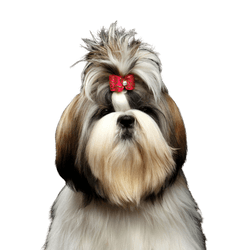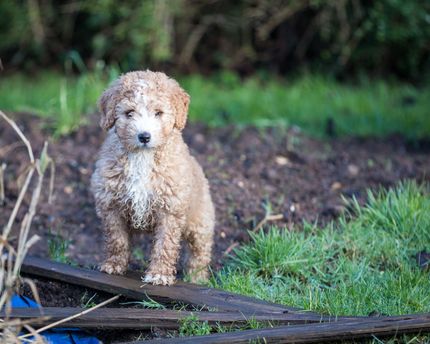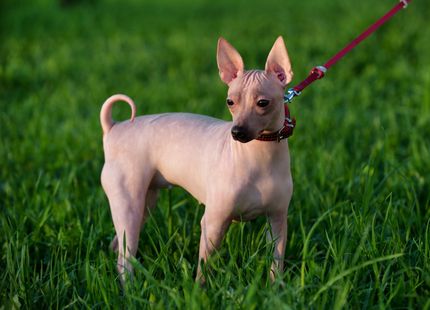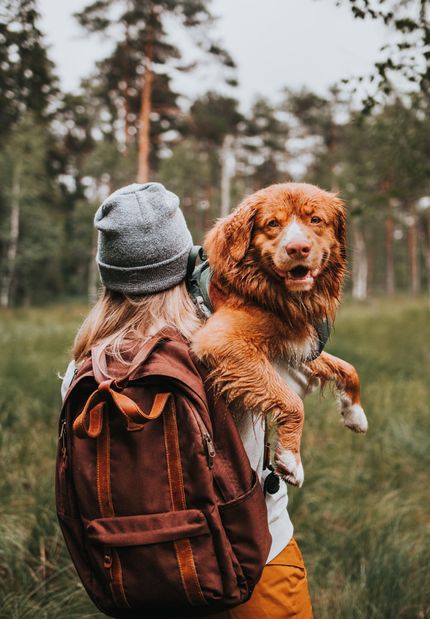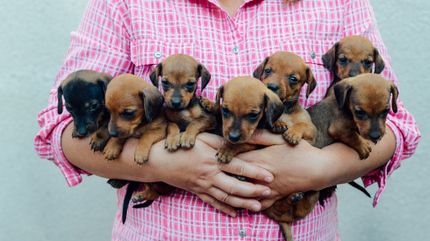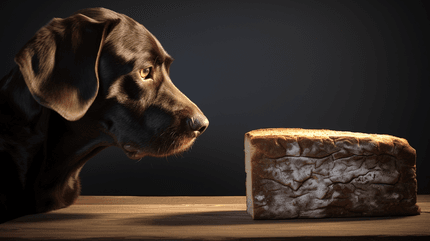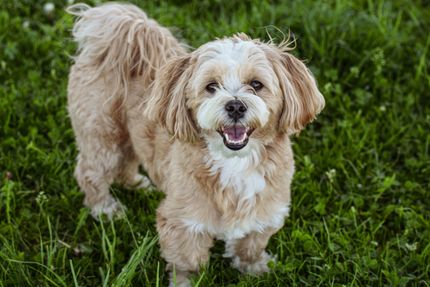Facts & Origin
Pug and Shih Tzu in one
The Pug-Zu is a designer hybrid breed created from the deliberate crossing of a Pug and a Shih Tzu. The aim of this mix was to combine the playful, friendly nature of the Pug with the gentle, charming personality of the Shih Tzu - and possibly mitigate some of the health problems of both breeds.
Selective breeding of the Pug-Zu probably began in the early 2000s, particularly in the USA, as part of a trend to combine popular small dog breeds to create strong character, family-friendly and socially acceptable companion dogs.
Criticism of the Pug-Zu
As with many designer dogs, the Pug-Zu is also viewed critically, particularly with regard to breeding ethics and health. Both parent breeds - the Pug and the Shih Tzu - belong to the brachycephalic breeds (short muzzle), which means that despite the mix, the Pug-Zu can remain prone to breathing problems, heat intolerance and eye problems.
Another point of criticism relates to marketing: the Pug-Zu is often advertised as the "perfect little family dog" without any reference to the actual care and health requirements. In addition, the appearance of this hybrid breed varies considerably, which means that puppies can also have significantly different characters and health dispositions.
Responsible breeding requires careful selection and health testing of both parents to reduce the risk of serious hereditary diseases - which is not always the case.
Suitability of the Pug-Zu
The Pug-Zu is a friendly, adaptable and affectionate companion dog if raised lovingly and kept appropriately. It is particularly suitable for families, couples and individuals who are looking for a small, playful and cuddly dog.
Typically, the Pug-Zu:
Playfulness and cheerfulness (from the Pug)
Affectionate and calm nature (from the Shih Tzu)
Social compatibility with people and other animals
Low sporting requirements, but enjoys walks and play sessions
They are ideal for living indoors, but need daily attention, moderate exercise and regular grooming - especially if their coat is longer and thicker. A certain sensitivity to heat and high humidity should also be taken into account.
With its loving nature and adaptability, the Pug-Zu is a great companion - provided you have the necessary patience, willingness to care for it and veterinary attention.
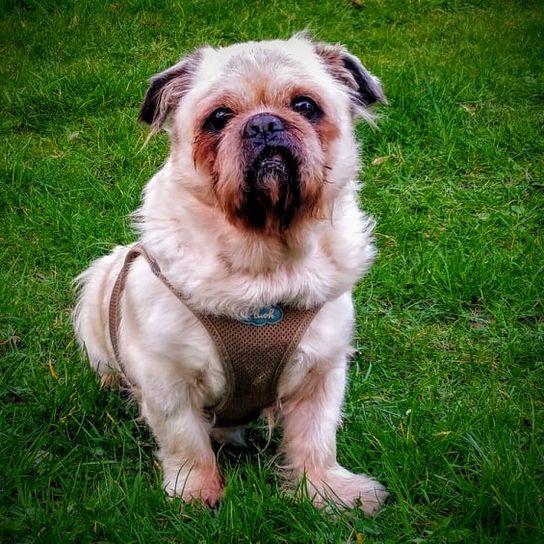
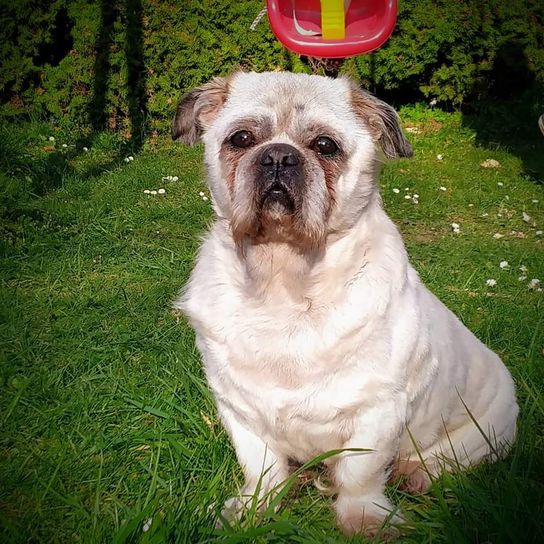
| Alternate Name | Pugzu, Shug, Pug-Shih-Tzu mix |
| Origin | China - Tibet |
| Life expectancy | 10 - 16 years |
| Care requirements | low-maintenance - high-maintenance |
| Activity level | low |
| FCI group | not recognised |
| AKC group | not recognised |
| KC group | not recognised |
More Pug mixes
More Shih Tzu mixes
Attitude, character and temperament of the breed
Possible character traits of the Pug-Zu
The Pug-Zu is generally a friendly, playful and people-oriented little dog. It often combines the playful cheerfulness of the Pug with the gentle, calm nature of the Shih Tzu.
Typically, the Pug-Zu loves to be the center of attention, enjoys any kind of attention and forms a close bond with its caregivers. They are often very social, friendly towards strangers and compatible with other pets.
Its adaptability makes it an ideal companion for different living situations - whether for couples, singles or families with older children. At the same time, the Pug-Zu sometimes has a certain stubbornness or slight stubbornness - which makes consistent but loving training important.
His energy level is usually moderate: he loves short, cheerful games, relaxed walks and extensive cuddling time, without an excessive urge to move.
Character
Usage
Possible diseases of the Pug-Zu
As with all hybrid breeds, hereditary diseases can also occur in the Pug-Zu, especially as both parent breeds are brachycephalic dogs.
Typical health risks in the Pug-Zu:
Breathing problems due to short muzzle and narrow airways
Eye diseases, e.g. corneal injuries or inflammation
Skin fold problems, especially with a pronounced pug proportion
Ear infections, especially with drooping ears and thick hair
Dental problems caused by small dogs with narrow jaws
Allergies and skin problems
Heat intolerance, due to the short airways and compact body shape
Responsible breeding, regular veterinary check-ups, appropriate exercise (especially in hot weather) and good grooming are essential to ensure the Pug-Zu's quality of life.

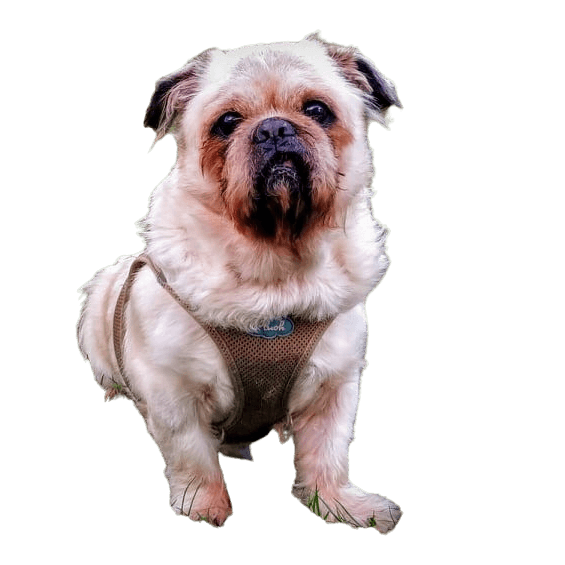
This is what a Pug-Zu can look like
The appearance of the Pug-Zu varies depending on its disposition, but generally ranges between the parent breeds. It is a small, compact dog with a shoulder height of around 20 to 30 cm and a weight of between 5 and 8 kilograms.
Typical features are:
A round, expressive head
Large, dark eyes
Short to medium-length muzzle, usually slightly longer than the classic pug
Hanging, slightly feathered ears, depending on the coat structure
The coat can be short, medium-long or slightly wavy - depending on whether more Pug or Shih Tzu genes dominate. Many Pug-Zus have a soft, high-maintenance coat that requires regular brushing and occasional trimming.
Coat colors are very diverse: from cream, fawn, black, white, gray to multi-colored varieties with patterns or markings.
Overall, the Pug-Zu has a friendly, charming and alert appearance, with a mixture of the typical Pug mischievousness and the elegant grace of the Shih Tzu.
Known Diseases
Hip dysplasia (HD)
Hip dysplasia (HD) is a genetic condition in dogs where the hip joint is not shaped properly. This leads to pain, stiffness and restricted movement.
Denture malocclusions
Malocclusions of the dentition often occur in dogs with short muzzles.
Shortness of breath
Difficult breathing can be recognized by the dog's rattling and sometimes accelerated breathing rate.
Overweight
Often, unfortunately, the dogs very much under excess weight. But the dogs themselves are never to blame!
Heart disease
Can occur frequently in dogs and can sometimes be treated with medication.
Breathing problems
Dogs with shortened muzzles can often experience respiratory problems.
Eye infections
Chronic eye infections can be very painful in dogs and can be treated with medication. In rare cases, the cornea must be treated.
Patellar luxation
Patellar luxation is the term used to describe a displacement of the kneecap, which is one of the most common causes of lameness in dogs.
Knee injuries
Some breeds, unfortunately, especially suffer from knee injuries of various kinds.
FAQ
-
This depends on the type of coat the dog has. Some Pug and Shih Tzu mixes have coats that shed very little, while others shed quite a lot.
-
Yes, Pug-Zus are generally good with children and other pets. They can be playful and affectionate, but they can also be protective of their family.
-
Pug and Shih Tzu mixes are easy to train if you use positive reinforcement methods. They can be stubborn at times, but are usually willing to please their owners.
-
Pug-Zus don't need a lot of exercise, but they do need some daily activity. A short walk or a play session is enough.
-
Pug and Shih Tzu mixes are prone to some health problems, such as obesity, respiratory disease and joint problems.


